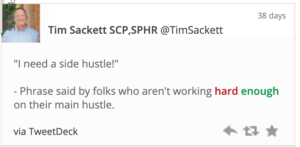A bunch of folks have been doing some work at home or furloughed at home, or some laid off at home over the past few months. Depending on your situation I’ve been hearing more and more from people who are out interviewing for the first time in a long time and looking for advice.
JDP did a survey recently and found out that the average candidate preps for 7 hours to prepare for an interview! I’m not sure I buy into that piece of data, it seems like there might be a bit of exaggeration going on from candidates who want to make you believe they actually did way more than they actually do.
Let’s be honest, you looking at a companies website and reading reviews on Glassdoor doesn’t take you seven hours. It probably takes you about 30 minutes, and I would bet my career on the fact that is about 99% prep that happens for most candidates.
How should you prepare for an interview?
There are two types of candidates I see in an interview. The first type just lets the interview happen to them. They basically react. I’m here, you have questions, let’s see how this turns out.
The second type of candidate, which is much rarer, come prepared to put on a show. I’ll call it the “You” Show! This candidate comes in and has prepared to show you why they are the person for this position. They risk that you might be the type of person who won’t like this, but more times than not I find leaders are actually impressed by these candidates.
What does the “You” Show script include?
It starts off with an introduction that includes a good story that will instantly get those in the room on your side. It might be funny, might be inspirational, but it was definitely planned and prepared. Anywhere from three to five minutes of this is who I am and why I’m unique, and why you should like me.
The You Show candidates have also prepped by doing research on those who will interview them. They probably know more about the people interviewing them, then the people interviewing know about you as the candidate. They’ll stalk your LinkedIn profile, your social footprint, Google name search, people from my school who work there, etc. I want to know my audience if I’m putting on a show, so I at least have a chance to producing a show they’ll like.
If I have one hour, planned, for the interview, I want them to hear 55 minutes of me, and very little from them. I want them leaving that room, call, video conference being wowed! Being of the mindset that we really don’t need to interview any longer, since we just found the person.
The “You” Show is probably an exaggeration of your true self. Kind of like, “Hey, this is the best me” and while I might not be this person every minute of every day, when you get the best of me, this is what you can expect. The “You” Show is high-energy, fully caffeinated, I’m going to energize you and when I leave you’ll feel better about yourself.
As you get ready for your next interview ask yourself if you would want to watch you do that interview. If your answer is “no”, it will probably be “no” from those interviewing you as well.



